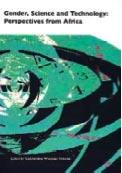Gender, Science and Technology: Perspectives from Africa
Synopsis
CODESRIA Gender Series Volume 6, 2008, 177 p., ISBN: 2-86978-221-1
Science and technology is widely advocated as the indisputable foundation for political and economic power in the modern world. However, it still remains marked by various layers and dimensions of gender inequality that work to the disadvantage of girls and women. Despite the fact that a lot of awareness has been created and that gender issues are now more readily acknowledged by various development initiatives in Africa, participation in science and technology remains a hurdle as far as girls and women are concerned.
A common theme that runs through the book is how feminine identities, ideologies of domesticity and gender stereotypes, and the inadequacy or lack of clear policies facilitate the invisibility of women in science and technology. This notwithstanding, women have never ceased devising clever and ingenious ways to enable them to master nature, from the margins.
Chapitres
-
Prelim
-
Introduction
-
Discourse and Practice of ScienceImplications for Women in Africa
-
National Policy on Science and TechnologyAn Integral Component of Development Strategy for African Countries
-
Binary Synthesis, Epistemic Naturalism and SubjectivitiesPerspectives for Understanding Gender, Science and Technology in Africa
-
Educational Policies and the Under Representation of Women in Scientific and Technical Disciplines in Niger
-
Girls Opting for Science Streams in BeninSelf-Renunciation or Discrimination in the Educational System?
-
Towards Gender Sensitive Counseling in Science and Technology
-
Early Scientists Were Men; So Are Today’sPerceptions of Science and Technology Among Secondary School Students in Kenya
-
Looking Beyond AccessA Case Study of Science and Technology Education for Girls in Murang’a District, Kenya
-
Gendered Views of Science and Technology in the Performing ArtsCharacterisation and Casting in the Kenya Schools Drama Festival Items
-
Repositioning Computer StudiesCultural Context and Gendered Subject Choices in Kenya
-
Busy Career and Intimate LifeA Biography of Nahid Toubia, First Woman Surgeon in Sudan
-
Assessing the Impact of Coffee Production on Abagusii Women in Western KenyaA Historical Analysis (1900–1963)
-
Gender-Based Associations and Female Farmers Participation in Science and Technology Projects in Anambra State of Nigeria
Téléchargements
Références
Bratton, M., 1987, ‘Drought, Food and Social Organisations of Small Farmers in Zimbabwe’,in M. Glartz, ed. Drought and Hunger in Africa, Cambridge: Cambridge University Press.
Chambers, R., 1983, Rural Development: Putting the Last First, London: Longman.
Cernea, M., 1987, ‘Farmer Organisations and Institution Building for Sustainable
Development’, in Regional Development Dialogue, Vol. 8, no. 2, pp. 1-19.
Esman, M. and Uphoff, N., 1984, Local Organisations: Intermediaries in Rural Development,Ithaca: Cornell University Press.
Holmsquist, F., 1980, ‘Peasant Political Space in Independent Africa’, Canadian Journal of African Studies, Vol. 14, no. 1, pp. 156-67.
Kitetu, C., 1998, ‘An Examination of Physics Classroom Discourse Practices and the Construction of Gendered Identities in a Kenyan Secondary School,’ unpublished PhD. thesis, Lancaster University.
Oakley, P. and Marsden, D., 1984, Approaches to Participation in Rural Development, Geneva: International Labor Office.
OAU/ILO, 1983, ‘Democratisation of National Development in Africa’, proceedings of a symposium in Dakar, March 15-18, 1984, Geneva: International Labor Office.
Rahmato, D., 1991, ‘Peasant Organisations in Africa: Constraints and Potentials’, Dakar: CODESRIA.
UNECA, 1990, Africa Charter for Popular Participation in Development and Transformation, Addis Ababa: United Nations Economic Commission for Africa.






